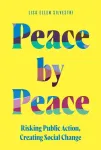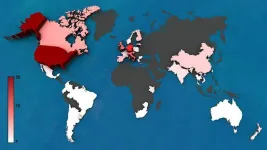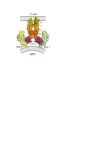UNIVERSITY PARK, Pa. — Dark-humored memes — like “This is fine,” featuring a dog wearing a bowler hat in a room on fire — tend to dominate social media during times when the world appears to be falling apart. But what bothers people most can spur action and change, especially on the local level, according to Lisa Silvestri, associate teaching professor of communication arts and sciences at Penn State.
Silvestri shifted her research focus to peace- and community building after studying war and its onset for more than a decade. Her new book, “Peace by Peace: Risking Public Action, Creating Social Change,” tells the stories of ordinary individuals who took small steps to make big changes in their local communities. The book offers a blueprint for tackling local challenges and reconnecting with physical spaces and people.
Penn State News spoke with Silvestri about her book, the modern problems it addresses and how ordinary people can take small steps to make large impacts.
Q: Where did the idea for “Peace by Peace” come from?
Silvestri: The idea emerged in summer 2018. I just had my first child and was living in Washington state. I was on parental leave. That can be an isolating feeling, especially when you're someone who loves going to work like I did, seeing my colleagues and my students, and then suddenly I'm in this house with a newborn, the demands were different, and I was tired. Plus, wildfire smoke led to a city ordinance to stay inside.
All I was hearing on the news was sadness, dislocation and separation. I thought, this is not who we are, and this is not the world that I want for my child. I needed to hear that people were doing good things, so I curated an email list of people who I knew were artists, philosophers, changemakers and community activists. I said, hey, who's doing small-scale, life-giving, community building type work? Responses started peppering in, and I thought how I would love to talk to these people and find out how they got started. Always aware of my role as an educator, I wanted to glean some tips for my students who want to do good in the world. I was crowdsourcing hope.
Q: You start the book talking about this concept called “drift.” What is it, and how did we get here?
Silvestri: Drift is this experience of aimless, inner floating, a general feeling of detachment. Around 2015, I was teaching a class on digital culture. What was hot at the time were these nihilistic memes, really dark humor that was circulating primarily among my age demographic, millennials. What does it say about the zeitgeist that we're feeling this nihilist impulse? I wrote an academic article on nihilism for the International Journal of Cultural Studies about this feeling of — not total passive nihilism, as in throw up your hands — but more like nothing means anything anymore, so why don't we try to build something with meaning. People wanted to make change, but they weren't quite sure how to go about doing it.
This nihilist feeling seemed to emerge from the idea that we don't have any permanent relationships anymore to places, spaces, communities or each other. In 2000, sociologist Robert Putnam published a book called “Bowling Alone,” in which he notices that we don't have social institutions anymore, places like churches, bowling alleys or even malls where we gather together. Millennials were kind of the last generation to hang out at the mall as teenagers, and now our poor Gen Z kids have nowhere to hang out but online. All this was before the COVID-19 pandemic, which separated us even further. Now families are flung far across the country or the globe, and individuals are geographically removed from the social institutions they grew up with, from family and friends who gave them a sense of identity. The gig economy happened, the share economy happened, shifting the work experience from long-term, face-to-face jobs to short-term, freelance work facilitated through digital platforms. All of this made our relationships to one another and the places where we live impermanent.
Sociologist Zygmunt Bauman describes our relationships like we’re tourists to our coworkers and neighbors. There used to be a sense of permanence built into our everyday life where we knew we were going to see the same people all the time, and so we felt some sense of obligation and responsibility to them. We knew we were going to live in the same home and in the same neighborhood, and so we felt a sense of commitment, care and concern. Now we have this Teflon cosmopolitanism where we slide past each other in a way that nothing meaningful really sticks. That is what created these conditions for drift.
Q: In the book, you identify practical wisdom as a tool to counteract drift. Can you describe what it is and how the average person can practice it?
Silvestri: Practical wisdom is the capacity to discern a practical course of action, one that preserves noble values, in unusual or complicated situations. The definition implies time and place because of its emphasis on the sticky particulars of the present situation. When we are experiencing drift, it's hard to anchor ourselves in the context long enough to look around and consider what is the right thing to do. But if we give ourselves the space and grace, we often know what the right action is even if it seems impractical or irrational, like allowing a loved one to remain in a hospital room after visiting hours. That is a practically wise thing — to know the rules but use your judgement.
Practical wisdom is an old concept developed by the ancient Greek philosophers. Socrates, Aristotle and others considered it a virtue, and that we all have the capacity for practical wisdom. Today, not only do we have a hard time identifying those occasions in which we might do something practically wise, but we're also de-incentivized to do it. It's much easier to rely on bureaucracy or algorithms to make choices for us, because practical wisdom relies on human judgment, and human judgment is discerning, creative and inventive.
I identify practical wisdom as a potentially good response to conditions of drift because it forces you to think about the time, place and your capacity for doing the right thing. We all have different capacities depending on our position, our social power as well as our resources. So, that's where it starts, locating the self within this broader experience of drift and letting yourself be bothered enough by something that you feel compelled to act.
Q: Each chapter of the book tells the story of an individual making a difference in their local community. Can you relate a story?
Silvestri: The scholar Cornel West has this concept called Santa Claus-ification that describes how people like Nelson Mandela or Mother Teresa have become in the public imagination these larger-than-life figures beyond our grasp. But we can identify regular people who maybe grew up working class, who aren't leading any sort of movement, they don't even consider themselves activists, who are doing the right thing, for the right reason, at the right time in their vicinity, without any kind of broader ego-centered outcome in mind. I like those stories because everyone can find someone or some aspect of these people to relate to.
Shawn Lent, a dance teacher in Chicago, started offering free dance classes to refugee children in her community. She learned that there's this big refugee population coming from different countries, they have had awful experiences with war, and she thought it would be a good activity to offer. She worked within her limit. She was already at the studio anyway, so why not do it? It was one hour a week.
She noticed that her Jewish and Arab students signed up for classes on Sunday because it’s a shared day of rest. Then she slowly integrated these classes for refugee children into the rest of the studio schedule. Now you see families from diverse backgrounds coming together to watch their children perform. It was a great way to blend the community. It’s these catalytic moments that I find really fascinating.
Q: What steps can the average person take to avoid drift and build community?
Silvestri: So many people ask, what are your interests? Interests are so fickle. I love to ask my students what bothers them, because typically what bothers us is more consistent over the course of our life. When we think about ourselves on the playground and the types of things that bothered us, like seeing kids left out or some sort of injustice, that nugget is something that we carry with us. It just looks different over the course of our lives. Finding what bothers you is a good compass point for where you should put your energy and attention.
Next, accept, embrace and celebrate your smallness. You can't change the whole world, but you can change one heart at a time, and you can change the very specific conditions in a hyper-local scenario. In the context of social media and globalization, we often think that it doesn't matter what we do because it won't rise to the level of being an influencer or starting some sort of enormous movement. But why not do it? Do the small thing and sleep better at night. The global village has made it difficult for us to see the forest through the trees. Let's get local again.
Finally, talk to other people. Give what’s bothering you some air. We become radicalized when we're alone in our silos, but when we talk to other people in the brick-and-mortar world, we can get more of a healthy perspective and start to get things done.
END



